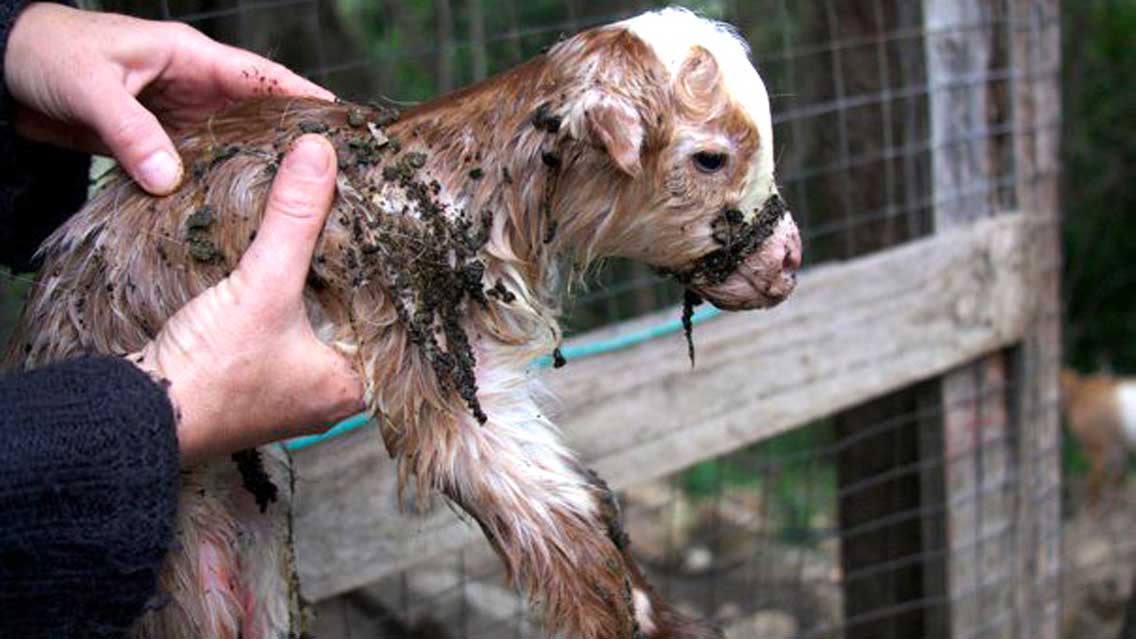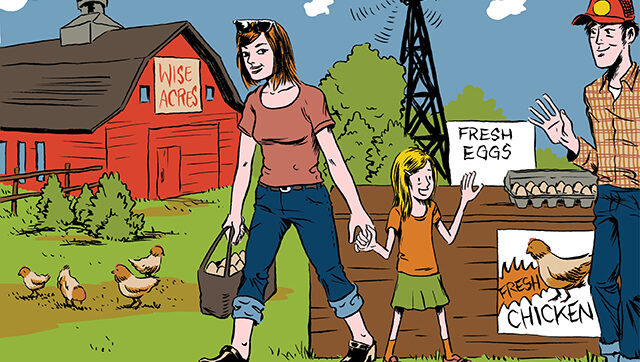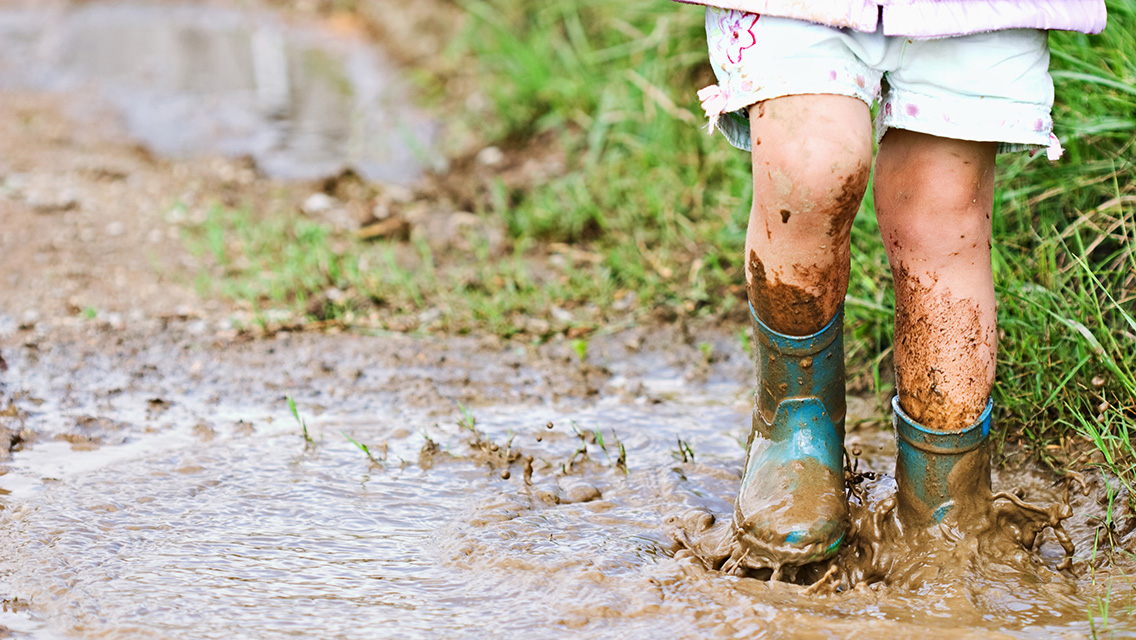Easing the garden fork into the soil a few inches from the yellowing leaves, I gingerly pry an onion from the earth of Bruffhof Farm in Switzerland. I’m self-conscious: a non-German-speaking American getting her hands in the dirt.
“Onion?” I ask, holding up my treasure. Farmer Franz Schwarz smiles and says, “Zwiebel!” Helping out on a farm, it turns out, is a cultural exchange that unites people who love both the land and its bounty.
After washing my zwiebel, I set it out to dry with the others we dug, then admire the garden and rolling pastureland. Bruffhof Farm is part of the “Swiss Sleep in Straw” network in which visitors pay to bed down in the barn — not with the animals, but sometimes in an adjacent area.
Guests can assist with farm chores if they want: At Bruffhof in mid-September, there are squash and apples to pick, goats to milk, eggs to collect. And the fee we pay to participate in the program helps farmers make ends meet.
Dinner that night includes rösti, a fried potato-and-onion dish with an earthy flavor redolent of the vegetables we just harvested. After the farmhouse feast, it’s time to bunk down.
Bruffhof’s hayloft is above a shed full of tractors, not cows, so my friends and I are spared the manure smell — except when we trek past the barn to the bathroom. We spread our sleeping bags in the hay. The straw tangles hair, gets inside pajamas, and rustles every time someone rolls over, suggesting the presence of smaller, scurrying life forms. It takes pattering raindrops on the roof to lull me to sleep.
Too early, a rooster announces sunrise. My straw nest has lost its fluff. But then I hear goat bells and the soft lowing of cows, and I have a Heidi moment. This is my childhood dream: to be on a farm, breathe mountain air, eat fresh Swiss cheese and, yes, sleep in the hay.
Dig In
Bedding down in a barn is not everyone’s idea of a vacation, but for city and suburb dwellers who are itching to give farm life a try, there are a number of options. Organizations like the Swiss Sleep in Straw network provide added income to farmers and allow visitors the opportunity to participate in chores — or just observe a farm in action. And for budget travelers unafraid of getting a little dirt under their fingernails, there are organizations like World Wide Opportunities on Organic Farms (WWOOF), which connects would-be farmers with farm-stay opportunities all over the world.
Volunteer helpers, called WWOOFers, travel to organic or pesticide-free farms in 50 countries, exchanging their labor for free room and board. Generally, volunteers work four to six hours a day and receive training in organic agriculture or livestock care. During free time, they explore the surrounding area. (WWOOFers are responsible for their own travel and personal expenses and for accident/health insurance in the country they’re visiting.)
“WWOOFers in the United States have tripled since 2008,” says Sarah Potenza, executive director of WWOOF–USA, which has a network of 1,400 organic farms in 49 states, Puerto Rico and the U.S. Virgin Islands.
That surge in interest is due to increased awareness of organic, seasonal food; the desire to grow our own food; and the quest for more meaningful vacations, Potenza says. And it’s not just diehard gardeners who become WWOOF volunteers. Anyone in reasonably good health who enjoys working outdoors is a fine candidate.
WWOOF farm opportunities are widely varied: Volunteers herd cattle in Wyoming, pick mangoes in Belize, tap maple trees in Vermont, harvest coffee in Costa Rica, bee-keep in Iowa, nurture vineyards in France, and raise alpacas in Alaska. Avid gardeners can tend orchids in Australia, weed medicinal herbs in Oregon or cut dahlia blooms in California.
WWOOFing experiences can last from a weekend to a couple of months. And your helping hands are much appreciated. In fact, Larkin Stentz depends entirely on WWOOFers and interns to help him farm certified-organic vegetables at Green Angel Garden & Sustainability Center in Long Beach, Wash. Volunteers on his farm spend six hours a day, five days a week, doing physically demanding work such as shoveling compost or weeding on hands and knees. “I call farming ‘garden yoga’ because it’s a practice that teaches us to live in harmony with the earth,” Stentz says.
He teaches his helpers biointensive farming, compost making, graywater catchment, and how to harness solar and wind power. “Previous farm experience is unimportant,” Stentz says. “All I ask is that volunteers come with a passion for growing the food that nourishes us and the planet.”
Here’s what three WWOOF volunteers have to say about why they decided to spend their vacations digging in the dirt, and what they found there.
City Escape
In 2010, after a hectic year, Alexandra Marr, 32, needed a break. Fed up with her claustrophobic life in Manhattan, and struggling to decide whether to return to her native Wales, she found calm by milking goats and mending fences on Apple Pond Farm, just two hours away in the Catskills.
A two-week WWOOF volunteer trip was the perfect escape for Marr, who had grown up helping her father garden and had worked on a horse farm as a teen. She even wondered about someday having her own farm.
Trading in high heels for Wellington boots, Marr threw herself into chores every morning at 7. “It helps if you’re relatively fit and strong — and if you don’t mind getting dirty,” she says. By 9:30 at night, she collapsed onto the couch in the study, which was her bedroom. “It wasn’t hugely comfortable, but I was so exhausted that I slept like a log.”
Eating fresh vegetables and drinking milk she had squeezed from the goats’ udders was rewarding. Marr also helped with butchering. “If you’re on a farm with animals, you realize that they’re bred for meat,” she says. “These farmers treat all the animals with great respect, so I felt comfortable with the butchering. It was my choice to do it.”
After deciding she preferred the satisfied exhaustion of farm life to city burnout, Marr decide to return to the U.K. She still does some work in marketing, but she’s done being a city slicker. She currently splits her time between Wales’ rural Brecon Beacons area and London.
Seeds & Surf in Spain
“WWOOFing is the perfect cheap way to travel,” says Michael Sepulveda, 27, who stumbled upon the online organic farming community while researching a six-month backpacking trip through Europe and Africa. “The idea of working four to five hours per day in exchange for a place to sleep and healthy organic food totally appealed to me.”
The listings of WWOOF farms in Spain, Sepulveda’s first destination, revealed his ideal setting: Casa Luz, a farm B&B run by an English couple on the southwest coast. The workday lasted from 8 a.m. to lunchtime; after that, Sepulveda borrowed a surfboard or bicycle and caught a wave or toured the picturesque coast. “WWOOFing allowed me to basically live for free for two weeks,” he says. “The only time I spent money was to buy tapas and the local drink — a beer-lemonade mixture — at the bar.”
Sepulveda shared bunk beds in a tiny casita with a Canadian man, with whom he still keeps in touch. Besides clearing weeds and overgrown grasses, building bamboo supports for tomatoes, planting seeds, and preparing the soil for the next crop, Sepulveda also helped with the B&B’s activities. “I loaded surfboards on the van, washed wetsuits and aided with bicycle tours,” he says.
“I am living proof that anyone can farm,” says Sepulveda, whose first farm experience taught him a lot about organic composting. “If you can dig a hole with a shovel, pull weeds, and are open to new experiences, you too can be a WWOOFer!”
Family Affair
Jacqueline Edelberg, a Chicago artist and writer, has a summer tradition: Put her two kids in the car and “just show up somewhere and figure out what we want to do for a month.” Last August, the family landed at the 14-acre Earthen Path Organic Farm in Lake City, Minn., just in time to take charge of the entire operation — including llamas, goats, chickens, fruits and vegetables, and a general store — while the farmer took his first vacation in 20 years.
Before he left, the WWOOF host farmer showed them the ropes. “I kept thinking, ‘We know nothing about farming,’” Edelberg admits, but with the help of Maya, 13, and Zack, 11, plus two teenage farm interns, they actually managed for three weeks.
Some chores were fun, if repetitive. Picking strawberries, feeding the goats and llamas, and collecting eggs — all before breakfast. Other work was unsavory, like “mucking” a barn. And accommodations were bare bones: sleeping on the floor of a concert stage for folk music.
“The kids discovered where food comes from,” Edelberg says. And it changed their thinking. At the grocery store, Zack now rejects cucumbers that “haven’t been treated well.”
“Working on a farm stretches your horizons, but it isn’t remotely Disneyland,” says Edelberg. “By the end, the kids had had enough. So we spent our final vacation time at a theme park riding water slides.”
This summer, the family hopes to continue their WWOOF farm tradition — wherever the adventure takes them.
Resources
- World Wide Opportunities on Organic Farms (WWOOF): www.wwoof.org
- Farm Stay U.S.: Network of accommodations on working farms. Help with chores is usually welcome. www.farmstayus.com
- Swiss Sleep in Straw: 20 to 30 Swiss francs per person per night, including breakfast: www.schlaf-im-stroh.ch (click “English”)



This Post Has 0 Comments